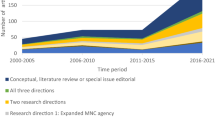Abstract
Using a behavioral model of political decisionmaking, it is argued that an increasing population size and/or an increasing efficiency of production in a private enterprise economy relative to a centrally planned economy may create the conditions for a self-interested nomenklatura in a Soviet-type economy to consider a transition to a market economy. This transition may be thwarted, however, by the threat for prospective private enterpreneurs of exploitation after the change of regime. Some form of political pluralism guaranteeing sufficient political influence to private entrepreneurs appears to be required for a successful transition. The analysis shows that such a combined political and economic reform can be in the interest of the nomenklatura, thereby providing an endogenous behavioral explanation for a change of regime.
Similar content being viewed by others
References
Bardhan, P. (1990). Symposium on the state and economic development.Journal of Economic Perspectives 4: 3–7.
Brus, W. and Laski, K. (1989).From Marx to the market. Oxford: Clarendon Press.
Coughlin, P., Mueller, D. and Murrell, P. (1990). A model of electoral competition with interest groups.Economics Letters 32: 307–311.
Day, R. (1982). Instability in the transition from manorialism: A classical analysis.Explorations in economic history 19: 321–338.
Hewett, E. (1989). Economic reform in the USSR, Eastern Europe, and China: The politics of economics.American Economic Review, Papers and Proceedings 79: 16–20.
IIASA. (1991).The Soviet economic crisis: Steps to avert collaps. International Institute for Applied Systems Analysis, Executive Report 91.
Inman, R. (1987). Markets, governments, and the ‘new’ political economy. In A. Auerbach and M. Feldstein (Eds.),Handbook of public economics: 647–777. Amsterdam: North-Holland.
Kanbur, S.M. (1979). Of risk taking and the personal distribution of income.Journal of Political Economy 87: 769–797.
Kihlstrom, R. and Laffont, J.J. (1979). A general equilibrium entrepreneurial theory of firm formation based on risk aversion.Journal of Political Economy. 87: 719–748.
Kornai, J. (1986). The Hungarian reform process: Visions, hopes, and reality.Journal of Economic Literature 24: 1687–1737.
Kornai, J. (1990a).The road to a free economy. New York: Norton.
Kornai, J. (1990b). The affinity between ownership form and coordination mechanisms: The common experience of reform in socialist countries.Journal of Economic Perspectives 4: 131–147.
Levitas, A. and Strzalkowski, P. (1990). What does ‘uwlaszczenie nomenklatury’ (propertisation of the nomenklatura) really mean?.Communist Economics 2: 413–416.
Lucas, R., Jr. (1978). On the size distribution of business firms.Bell Journal of Economics 9: 508–523.
Mueller, D. (1989).Public Choice II. Cambridge: Cambridge University Press.
Nove, A. (1979).Political economy and Soviet socialism. London: Allen and Unwin.
Pejovitch, S. (1990).The economics of property rights. Dordrecht: Kluwer.
Qian, Y. (1990).Hierarchy, loss of control, and a theory of state-ownership in socialist economies. Mimeo. Stanford University
Renaud, P. (1989).Applied political economic modelling. Berlin: Springer-Verlag.
Voslensky, M. (1980).Nomenklatura, die herrschende Klasse der Sowjetunion. Wien: Verlag Fritz Molden.
Winden, F. van. (1983).On the interaction between state and private sector. Amsterdam: North-Holland.
Author information
Authors and Affiliations
Additional information
A first and very preliminary draft of this paper was presented at the EEA and EARIE meetings in 1990, both in Lisbon. The authors are grateful for comments from Michael Ellman and Wim Swaan, from participants at the aforementioned meetings and the LOS-centre seminar (Bergen, Norway), as well as for financial support from the Netherlands Organization for Scientific Research. The usual disclaimer applies.
Rights and permissions
About this article
Cite this article
van Winden, F., de Wit, G. Nomenklatura, state monopoly, and private enterprise. Public Choice 77, 573–594 (1993). https://doi.org/10.1007/BF01047861
Accepted:
Issue Date:
DOI: https://doi.org/10.1007/BF01047861




